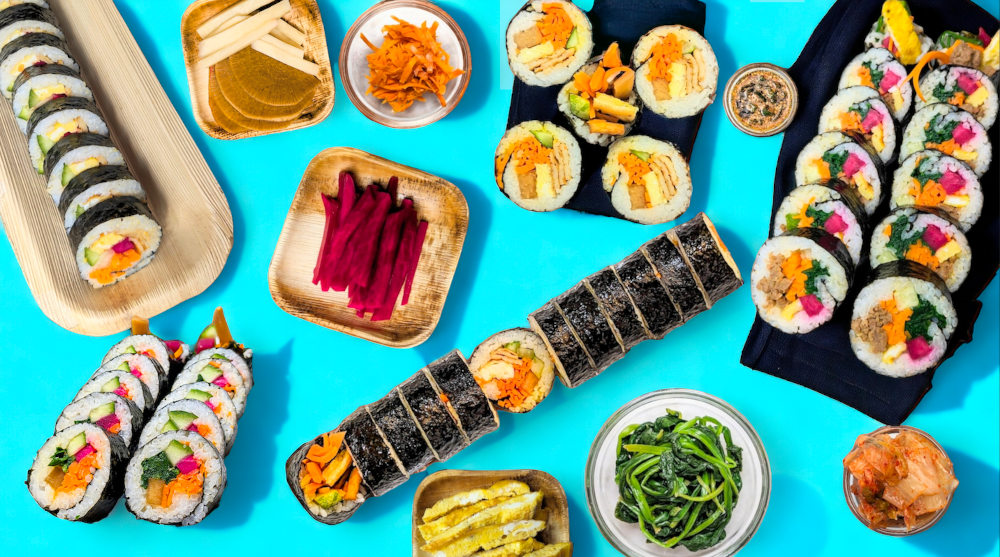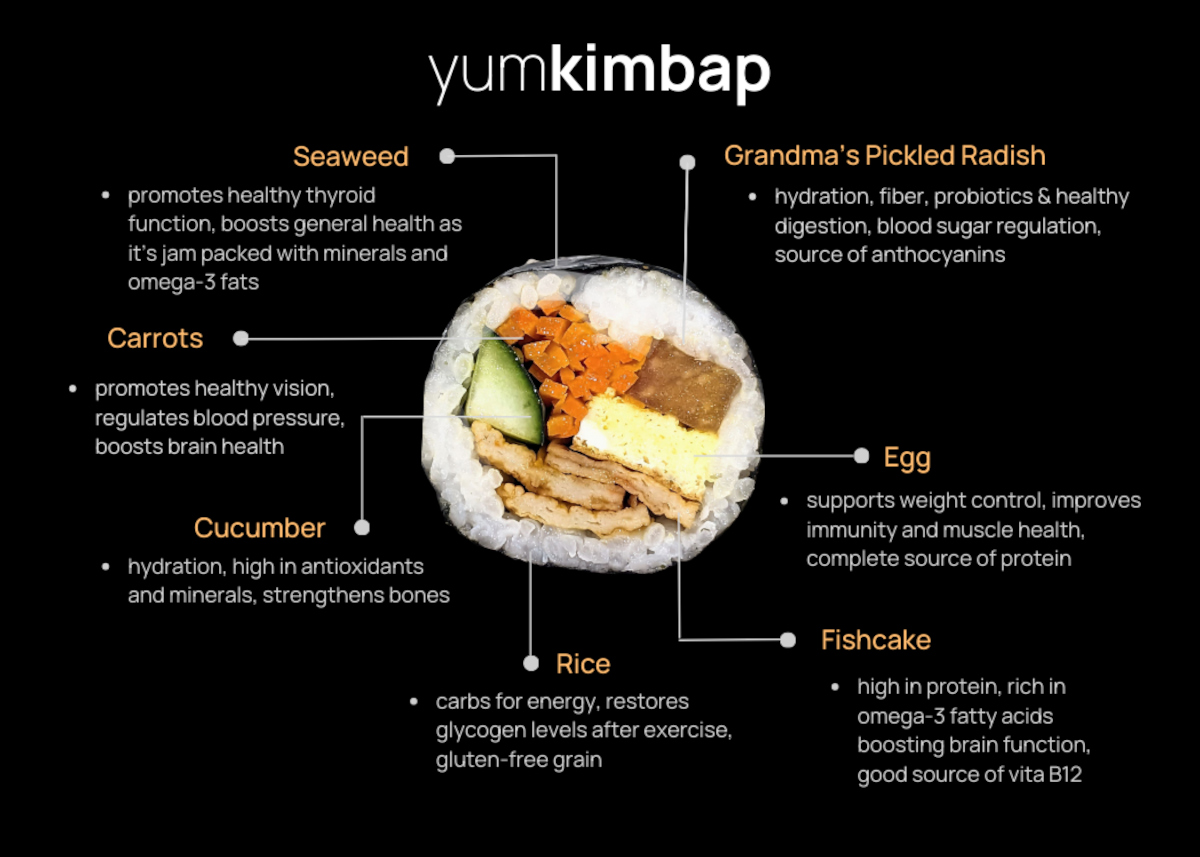About Kimbap
Whether you're a die-hard foodie or a curious newbie to Korean flavors, kimbap is a dish that promises to cater to all. So, let's roll into the world of kimbap and discover its wonders!
What is Kimbap?

Kimbap (sometimes spelled gimbap) is a popular Korean dish, beloved across the nation and beyond. Its name, 'kim' meaning seaweed and 'bap' meaning rice, succinctly describes this sushi-like roll. It's filled with a variety of ingredients, including steamed white rice, cooked and marinated vegetables, and often some type of protein like beef or fishcake. But make no mistake, kimbap is distinctly Korean, with unique flavors and ingredients that set it apart from its Japanese counterpart.
Kimbap vs. Sushi
While kimbap may resemble Japanese sushi rolls, the differences are notable. The rice in kimbap is seasoned with sesame oil and salt, rather than sushi's vinegar-based seasoning. This gives kimbap a distinct flavor that pairs harmoniously with its fillings, which often include cooked and pickled ingredients, unlike sushi's raw fish focus.
Ingredients and Varieties
A traditional kimbap roll includes steamed rice and various fillings, such as julienne carrots, spinach, cucumber, pickled radish, and proteins like beef, egg, or fishcakes, all wrapped in a sheet of dried seaweed. However, the beauty of kimbap lies in its versatility. There are vegetarian and vegan options and non-traditional ones like tuna, kimchi, cheese, and avocado.
Be sure to stay updated on yumkimbap's monthly specials where we drop a new kimbap variety for the month!
Benefits of Eating Kimbap
A nutrient-rich and balanced meal
Kimbap is packed with a variety of fresh vegetables, making it a jam-packed source of vitamins, minerals, protein, and fiber. With carbs from the rice, protein from the meat, egg, and seaweed, and vitamins from the veggies, kimbap offers a well-rounded meal. Learn more about the health benefits of eating kimbap here.
Customizable
Whether you're a meat lover, vegetarian, or have specific dietary needs, kimbap can be easily customized to suit your needs.
Convenient and portable
Perfect for quick or on-the-go meals, kimbap is easy to pack and carry, making it ideal for lunchboxes. It’s also highly convenient for busy families who want a healthier alternative to mac & cheese, grilled cheese, or fast food.
Who Should Eat Kimbap?
The Health-Conscious
If you're watching what you eat but don’t want to compromise on taste, kimbap is your go-to. It's filling, nutritious, and can be low in calories.
Busy Bees
For those who are always on the move, kimbap is a quick, convenient meal that doesn’t skimp on nutrition.
The Culinary Adventurers
If you love exploring different cuisines, kimbap offers a delightful taste of Korean flavors.
Picky Eaters and Kids
With its appealing presentation and customizable ingredients, kimbap can be a fun way to encourage picky eaters to try new veggies and proteins.
Origins
The origins of kimbap are somewhat debated, with some tracing its roots back to the Korean War, where it served as a convenient meal for soldiers and refugees. Others link it to the Japanese occupation of Korea, suggesting an adaptation of Japanese sushi to Korean tastes.
Seaweed was first recorded in Korean cuisine dating back to the early 1400s, and the culture of wrapping seaweed around rice was first recorded in the 1800s. Typically, on the first full moon of the first lunar month, dried and old vegetables were wrapped with vegetable leaves or seaweed and eaten in hopes of a good harvest for the coming year. Regardless of its beginnings, kimbap has become a symbol of Korean picnic food, often enjoyed during outdoor activities and family gatherings.
Order NowIs Kimbap Healthy?
Kimbap, which contains a variety of ingredients such as rice, vegetables, and protein, has excellent nutritional properties. The ratio of carbohydrates, protein, and fat is well-balanced, so you can enjoy your meal while feeling satisfied.
Each of our yumkimbap rolls is packed with flavor and nutrition. One of our kimbap rolls consists of 12 pieces and has the following health qualities:

Note: This illustration has fishcake as a protein; other protein options include beef bulgogi or spam.
Here’s a quick breakdown of Kimbap’s health benefits by ingredients
Seaweed contains 20 times more B vitamins than cheese and milk. This ingredient improves memory by directly supplying nutrients to brain cells. It's also a great source of iodine, which helps support your thyroid gland. Generally, seaweed also contains other vitamins and minerals, such as vitamin K, zinc, iron, and antioxidants that help protect your cells from damage.
Rice is the core source of carbs within kimbap and is an effective way to obtain glycogen, which can produce direct energy calories. It also serves as an energy supplement because the digestion process takes place without lots of work for your body, and is easily converted into glucose that is used as energy in your muscles.
Carrots are rich in beta-carotene, which helps promote healthy vision. Can can also help to balance your blood sugar, regulate blood pressure, reduce heart disease, improve immunity, and boost brain health. Let’s just say that you won’t regret adding more of this orange veggie to your diet.
Pickled daikon (radish) helps to improve your digestive or gut health, maintain a healthy weight, reduce inflammation, boost your immune system, and fight against depression and anxiety. The daikon inside our rolls are also pink in color because they were pickled/infused with organic red beets.
Cucumbers are great for hydration, as they are over 95% water. They are served fresh (and super crunchy) inside our kimbap which better preserves their benefits: helps regulate blood sugar levels (as they are low calorie and low carb), high in potassium to lower blood pressure, and high in antioxidants to reduce risks of cardiovascular disorder and diabetes. It’s also great for the skin to better regulate skin pH levels and strengthen skin elasticity.
Eggs are a standard protein in Korean kimbap and an ingredient many vegetarians (specifically ovo-vegetarians) want in their diet. And eating them is good for you in many ways! It helps prevent malnutrition, keeps your muscles healthy, makes you feel full, and can even help with losing weight. Eggs also have extra perks like protecting you from infections, lowering blood pressure, and having anti-cancer effects.
Other proteins like beef and fishcake come with their own set of benefits when eaten in moderation. For example, fishcake is a tasty and healthy choice for your diet as it’s packed with good stuff like lean protein, omega-3 fatty acids, and essential vitamins and minerals. Eating it can help keep your heart happy, boost your brain function, and support your overall well-being.
Because kimbap is filled with a variety of ingredients, it offers an excellent and well-rounded mix of nutrients.
Try yumkimbap for your lunch, family dinner, special event or team lunch meeting at work!
Order Now